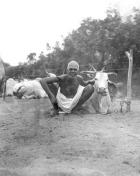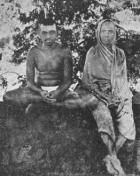Osho on Ramana Maharshi and death from cancer
Happiness and suffering happen due to our past actions. So do not think that physical suffering or happiness will not happen to those who have become liberated while living.
Ramana Maharshi died of cancer. It was very painful, naturally. It was a deep malady -- there was no way of escaping it. Many doctors came, and they were very puzzled because the whole body was torn with pain but there was no sign of any pain in his eyes. His eyes remained the same serene lakes as ever. Through his eyes only the witnessing self arose; it was the witnessing self that looked, that observed.
Doctors would ask, "You must be in great pain?" Ramana would reply, "Yes there is great pain, but it is not happening to me. I am aware that there is great pain happening to the body; I know that there is great pain happening. I am seeing it, but it is not happening to me."
A question arises in the minds of many people as to how a man like Ramana, who is liberated and enlightened, get a disease like cancer.
This sutra has the answer to it. Happiness and sufferings will be happening to the body, even to those who are liberated while living, because these are related to past actions and their impressions, they are related to whatsoever has been done before becoming awakened.
Understand it this way: if I have sown some seeds in a field and then I become awakened, the seeds are bound to sprout. Had I remained sleeping, then too the seeds would have sprouted, flowered and come to fruition. Now too they will sprout, flower and come to fruition. There will only be one difference: had I been still asleep I would think it to be my crop and keep it close to my chest. Now that I am awake, I will understand that the seeds were already sown and now they are reaching their destiny; nothing of it is mine, I will just go on witnessing. If I had remained asleep I would have harvested the crop and preserved the new seeds so that I could sow them next year. Now that I am awake I will just go on witnessing: seeds will sprout, flowers will come, fruits will grow, but I will not gather them. Those fruits will grow and fall off on their own accord and die. My relationship with them will snap. My relationship with them before was of having sown them -- now I will not do that again. Thus no further relationship will be formed.
So happiness and suffering keep coming to the liberated one also, but such a person knows that these are part of the chain of his past actions and now he has nothing to do with them: he will just go on witnessing.
When somebody comes and offers flowers at the feet of Ramana, he just goes on watching -- it must be a part of some past chain of actions that prompt this person to give him happiness. But Ramana does not take the happiness; the person gives, but he does not take it. Should he take, the journey of a new action will begin. He does not prevent the person from offering flowers -- "Don't give happiness to me, don't offer flowers to me, don't touch my feet" -- he does not prevent him, because that prevention too would be an action and another chain of action would begin.
Try to understand this. This man has come to offer flowers to Ramana; he has put a garland round his neck, he has put his head at his feet. And what is Ramana doing within? He is just watching: "There must be a past transaction with this man, some past impressions of action; the man is now completing it. But now the transaction has to come to an end, no further chain has to be created. This matter is finished here, it will not continue."
So he will just sit there and will not prevent that man from doing anything... because what will 'preventing' really mean? It will mean first, that you are not ready to take back the past action where you had given, and which you would have to take back when preventing this man's action. And second, you are creating another chain of relationship with this man by asking him not to do a certain thing. Now when will this new relationship end? You are creating another action; you are reacting.
No, Ramana will just go on watching, whether a man brings flowers to him or cancer comes. He will even watch the cancer happening.
Ramakrishna also died of cancer. He had throat cancer. Even water would not go down his throat; food would not go down his throat. Then one day Vivekananda asked Ramakrishna, "Why don't you tell mother Kali? It is just a matter of your telling her and in a moment your throat would be cured." Ramakrishna just laughed and said nothing.
One day, when Vivekananda had insisted too much,
Ramakrishna said, "You don't understand. It is necessary to be finished with whatsoever is one's own doing, otherwise one will have to came back again only to finish it. So it is right to allow whatsoever is happening to happen; it is not right to hinder it."
Then Vivekananda said, "Alright, if you do not want to ask to be cured, at least ask her that as long as you are in the body to let the throat be good enough to allow water and food to pass through. Otherwise it is unbearably painful for us to see you in such a condition."
Ramakrishna agreed to ask. When he woke up the next morning he said, "It was great fun. When I told the mother she said, 'Has this throat a monopoly in doing your work? What difficulty do you have in eating through others' throats?'"
Ramakrishna further said, "Because of listening to your advice, I acted like a great fool. You harassed me unnecessarily. And this is right -- does this throat have any monopoly? So from today onwards, when you take food, understand that I am also taking food through your throat."
Ramakrishna laughed continuously all day long. When the doctor came he said, "Why are you laughing? The body is in such a painful condition, and no other condition can be more painful than this."
Ramakrishna said, "I am laughing because I don't know what happened to my mind that I failed to remember that all throats are mine, that now I can take food through all throats. Why be obsessed about this one throat?"
Howsoever supreme a state an individual may attain, the past that is attached to the body will complete itself. Happiness and sufferings will come and go, but the liberated person will know that it is only the accumulated past actions. Knowing so, he will stand apart from them too and his witnessing will not be affected by them in any way -- his witnessing is now steady.
-Osho, "Fingers Pointing to the Moon, #13"



 https://oshofriends.com/on_maharshi/27981
https://oshofriends.com/on_maharshi/27981 Ramana Maharshi's Mother Enlightenment
Ramana Maharshi's Mother Enlightenment


